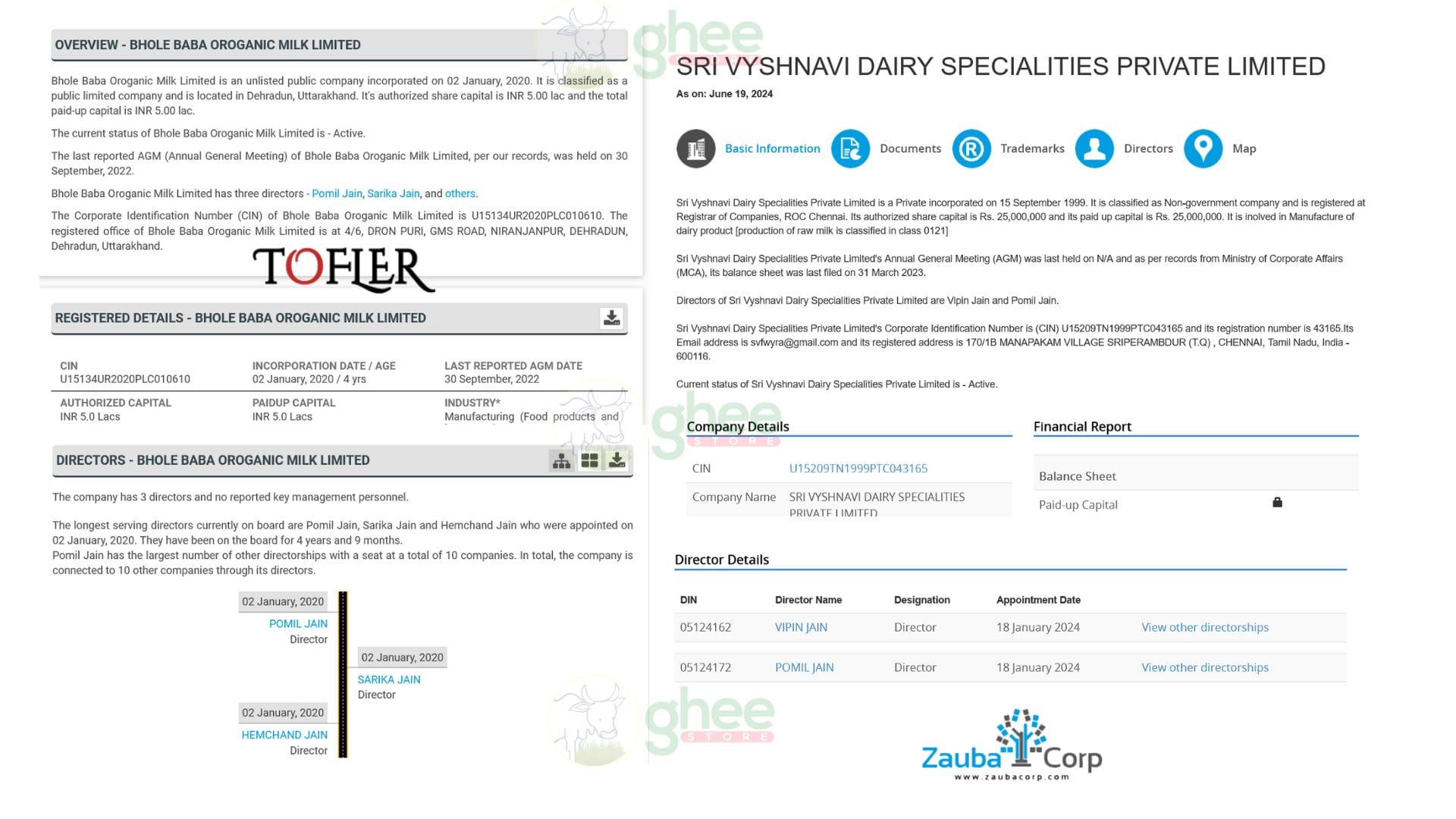- You have no items in your shopping cart
- Subtotal: ₹0.00

Owners of Sri Vyshnavi Dairy Specialities and Bhole Baba Organic Dairy in Tirupati Laddu Controversy
In light of the information gathered from the links provided regarding Sri Vyshnavi Dairy Specialities Private Limited and Bhole Baba Organic Dairy, it has been revealed that the ownership of both these companies is interconnected.
According to the Zauba Corp report on Sri Vyshnavi Dairy Specialities Private Limited, the directors of the company include
- Pomil Jain
- Vipin Jain
Additionally, the Tofler report on Bhole Baba Organic Milk Limited confirms the same names as directors:
- Sarika Jain
- Pomil Jain
- Vipin Jain
Expanded Article: Sri Vyshnavi Dairy Specialities and Bhole Baba Organic Dairy
The owners of Sri Vyshnavi Dairy Specialities and Bhole Baba Organic Dairy have recently come into the spotlight due to their involvement in a supply chain that led to the use of adulterated ghee in religious offerings, including the Tirupati Laddu controversy. Both companies are intertwined, sharing the same directors, raising concerns about transparency and the sourcing of dairy products.
Sri Vyshnavi Dairy Specialities Private Limited, based in Tamil Nadu, is one of the key suppliers in the region, particularly for ghee used in religious offerings. However, recent investigations revealed that the ghee supplied was not produced at Sri Vyshnavi Dairy but was procured from another company: Bhole Baba Organic Dairy, based in Uttarakhand. Both companies are linked through the same directors, including Sarika Jain, Pomil Jain, and Vipin Jain. This shared leadership has prompted further investigations into their business practices and the quality control measures implemented at both dairies.
The Controversy and Connection Between the Two Dairies: Sri Vyshnavi Dairy Specialities and Bhole Baba Organic Dairy
The controversy stems from the revelation that trucks carrying ghee used for the Tirupati Laddu did not originate from the expected source, Sri Vyshnavi Dairy, but were traced back to Bhole Baba Organic Dairy. According to reports, while Sri Vyshnavi Dairy is located in Tirupati, it was merely acting as a distributor, sourcing the ghee from Bhole Baba in Uttarakhand. This connection between the two dairies raises concerns about the integrity of the products being supplied for religious offerings, especially considering the sacred nature of the Tirupati Laddu.
Bhole Baba Organic Dairy has built a reputation for producing organic dairy products, but the involvement in this controversy has put its practices under scrutiny. Given that both dairies share the same directors—Sarika Jain, Pomil Jain, and Vipin Jain—it has become essential to assess the supply chain and ensure that quality standards are maintained.
Why Authenticity Matters in Ghee Production
The use of adulterated ghee in religious offerings like the Tirupati Laddu is not only a matter of religious concern but also one of public health and trust. Ghee, a staple in Indian households and religious ceremonies, is known for its purity and health benefits. However, when large-scale dairies cut corners by adulterating products or failing to adhere to traditional production methods, the result can be detrimental to both the product’s quality and the consumer’s health.
Traditionally produced ghee, often referred to as hand-churned ghee or bilona ghee, retains its nutritional value and is considered superior to mass-produced alternatives. Unfortunately, in the pursuit of profits, many companies resort to machine-driven production methods that compromise the product’s authenticity. The case of Sri Vyshnavi Dairy Specialities and Bhole Baba Organic Dairy highlights the importance of transparency in the supply chain, especially when it comes to products as revered and widely consumed as ghee.
The Impact on Consumer Trust
For consumers, the Tirupati Laddu controversy underscores the need to be vigilant about the sources of their food products. While mass-produced ghee may be more affordable and accessible, the hidden costs—such as the potential for adulteration and the loss of nutritional value—are significant. Consumers must choose suppliers and brands that emphasize transparency, quality, and traditional production methods.
Brands like GheeStore, which focus on using traditional methods to produce pure ghee and cold-pressed oils, provide a level of assurance to consumers. By prioritizing quality over quantity and staying true to ancient production methods, such brands ensure that their products deliver the promised health benefits without compromising on purity.
Conclusion
The Tirupati Laddu ghee controversy involving Sri Vyshnavi Dairy Specialities and Bhole Baba Organic Dairy serves as a wake-up call for consumers and businesses alike. As the investigation unfolds, it becomes increasingly clear that maintaining transparency in the supply chain and adhering to traditional production methods are essential for delivering quality products. Consumers should be cautious when purchasing mass-produced ghee and oils, opting instead for suppliers that prioritize authenticity and health.
The shared ownership between Sri Vyshnavi Dairy and Bhole Baba Organic Dairy—Sarika Jain, Pomil Jain, and Vipin Jain—further complicates the issue and calls for stricter regulations in the dairy industry. As consumers, it is crucial to support brands and suppliers that emphasize purity and transparency, ensuring that the products we consume align with the values of health, quality, and authenticity.



